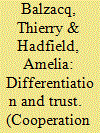|
|
|
Sort Order |
|
|
|
Items / Page
|
|
|
|
|
|
|
| Srl | Item |
| 1 |
ID:
116687


|
|
|
|
|
| Publication |
2012.
|
| Summary/Abstract |
One recent but major policy occurrence in Justice and Home Affairs - the Treaty of Prüm (2005) - has developed within the framework of differentiated integration, thus reopening the debate over the impact of flexibility on EU integration, what causes it, and whether it should be sought by Member States at all. Whatever the consensus, the debate itself demonstrates that the very idea of differentiated integration deserves a renewed attention today ultimately because it affects, in one way or another, the performance of the EU. This article presents a critical analysis of the practice of differentiation in Justice and Home Affairs, by examining its forms, principles and effects. It discusses the literature on the subject, emphasizing the complexity of flexible integration, but reaches different conclusions. Thus, in contrast to the dominant argument, we argue that differentiation is not necessarily about deepening and/or widening EU integration. It is also, and sometimes primarily, about power and interests, two major elements that feed mistrust among Member States. In fact, we demonstrate that mistrust can cause poor differentiation. Moreover, in the absence of trust among Member States, flexibility might contribute to sub-optimal policies. Based on past research and interviews, we substantiate our claim by investigating the driving factors, rationales and consequences of the Treaty of Prüm on the institutionalization of a EU area of Freedom, Security and Justice.
|
|
|
|
|
|
|
|
|
|
|
|
|
|
|
|
| 2 |
ID:
120570


|
|
|
|
|
| Publication |
2013.
|
| Summary/Abstract |
THE CURRENT CRISIS of the Economic and Monetary Union (EMU) is traditionally described as an illustration of the fact that the euro area was caught unprepared for such a high degree of integration. The crisis of financial markets, which began in 2007, has no doubt exposed systemic problems of monetary integration in the EU. Their essence is the weakness of the scheme under which countries are deprived of monetary tools to influence the economy by seceding them to the supranational level, but keep almost complete freedom of action in the macroeconomic sphere (particularly in fiscal policy, in determining the value of labor power, in the social security system). The current crisis also shows that to retain the achieved level of integration is possible only by deepening cooperation and forfeiting another portion of sovereign rights.
|
|
|
|
|
|
|
|
|
|
|
|
|
|
|
|
|
|
|
|
|